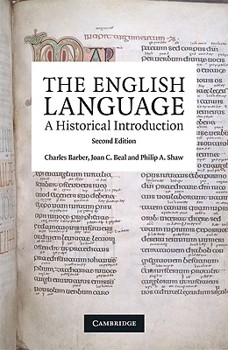The English Language: A Historical Introduction
(Part of the Cambridge Approaches to Linguistics Series)
Select Format
Select Condition 
Book Overview
This bestselling text by Charles Barber, with updating contributions from Joan C. Beal and Philip A. Shaw, recounts the history of the English language from its remote ancestry to the present day.... This description may be from another edition of this product.
Format:Paperback
Language:English
ISBN:0521670012
ISBN13:9780521670012
Release Date:April 2009
Publisher:Cambridge University Press
Length:320 Pages
Weight:0.85 lbs.
Dimensions:0.6" x 5.0" x 7.7"
Customer Reviews
5 ratings
une introduction excellente à l'histoire de la langue anglaise
Published by Thriftbooks.com User , 17 years ago
Ce livre est le premier que j'ai lu lorsque j'ai commencé à m'intéresser à l'histoire de cette langue si répandue, protéiforme et souple, cet ancien dialecte teuton heureusement civilisé par les Normands français, et naturellement les apports latin et grec. Clair, d'une lecture facile, voilà un ouvrage excellent de vulgarisation dont la lecture est à recommander à tous !
Very good, but tough sledding for a 'casual' reader
Published by Thriftbooks.com User , 17 years ago
This book seems like an excellent introduction to the history of English-language development. I would caution anyone who is considering this book to evaluate how technical a work they wish to read. If the annswer is 'not very' or even 'moderately,' I'd advise them to keep clear of Barber's text. He has many lengthy analyses of morphology and phonology changes of Indo-European, Proto-Germanic and Old-English words, which can be confusing or exhausting if a reader doesn't have a serious interest. (I do, but still think it's a bit dull.) My knowledge of this subject prior to reading the book was very general (i.e.-- of the 'I think the Normans invaded in 1066' type...), but I feel pretty grounded in the topic, after reading Barber's text...I'm ready to tackle Old English! Another caveat-- Barber is British, and bases all his pronunciations on British 'Received Pronunciation' rules, which may challenge American readers--like myself--trying to puzzle out his pronunctions...and a cursory knowledge of Latin and perhaps Greek or German can really help in understanding the 'pre-historical' aspects of his argument. A last note: an earlier reviewer has claimed that this book 'makes clear the relationship between Dutch and English.' I think he's misunderstood Barber's analysis, as Barber clearly states that English is most closely related to Anglo-Frisian, which is a branch of the West-Germanic group, but distinct from the Dutch/Old Franconian branch. The languages are hereditary, but not linear (according to Barber). This could be a niggling point, but may prejudice potential reader's to Barber. Overall, a great (but technical) read, and thrilling to a determined student of English-language development.
Informative good read
Published by Thriftbooks.com User , 23 years ago
If someone is interested in learning the origins, history, and development of the English language, then he or she will gain a lot from this book. There are many technical aspects included. It's also enjoyable. Many applied linguistic terms and areas are covered. From English's relationship to Sanskrit and other languages, to the great vowel shift explaining why English often doesn't sound the way it's spelled--difficult and illogical for students learning the language. The author went into depth about such topics as the culture of the Germanic tribes and how demographics influenced the development of the English language the way it did. The Scandinavians, French, and many others have loaded the language with with many loans words. It's a good informative read.
An excellent, if heavily technical, layman's guide
Published by Thriftbooks.com User , 24 years ago
This book is an excellent introduction to the history of the English language. As the other reviewers have noted, it's a bit top-heavy on technical linguistics, and therefore may not be suitable to everyone. But if you don't mind reading a book which could also be used as a 400-level college textbook... I think this book would appeal to any who have an interest in linguistics in general and the history on English in particular - especially if you've read other, lighter books on the topic already and you're ready to get seriously into the topic.I fit the above category, and I loved this book. Probably the best I've read on the subject so far.
great introduction to history of english language
Published by Thriftbooks.com User , 24 years ago
My interest in linguistics began when my latin teacher began talk about past forms of english in class. I was looking through the book store to find more about what he was talking about. Many of the titles looked either too thick or too long. then i came across this title. It was thin and supposedly for beginners like me. I thought i would give it a try and purchased it. When i got home i immediatly began to read. It was getting dark by the time i put it down. I am an avid fan of fiction, and only read non fiction for the information. I usually find it boring, yet informative and long to be finished with it. But this book i found was very interesting as well as informative and i could not put it down. It introduces you first to the various symbols used to show different sound and then wastes no time plunging you right into the beginnings of the language through old, middle, and early modern english. It was easy to follow as long as you had the symbols memorized and gave a brief history of the times when the languge was at certain stages. I finished it quickly and understood most of the stuff i read. Now i feel i can step up to the next level and read some of the more complex books. This book was a good foundation for my interest in linguistics and i found no fault in it.





